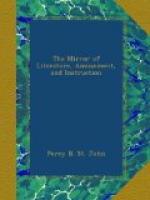“Oh God, that horrid, horrid dream
Besets me now awake!
Again—again, with a dizzy brain,
The human life I take;
And my red right hand grows raging hot,
Like Cranmer’s at the stake.
“And still no peace for the restless clay
Will wave or mould allow;
The horrid thing pursues my soul,—
It stands before me now!”
The fearful boy looked up, and saw
Huge drops upon his brow!
That very night, while gentle sleep
The urchin eyelids kiss’d,
Two stern-fac’d men set out from Lynn,
Through the cold and heavy mist;
And Eugene Aram walked between,
With gyves upon his wrist.
Mr. Planche’s versification of the homely proverb—Poverty parts good company—will create many good-natured smiles, and run counter with Mr. Kenney’s To-morrow. Some of the minor pieces are very pleasing, especially two by Hartley Coleridge, Esq.
We confess we do not admire the taste which dictated Mr. C. Lamb’s Widow; it is in every respect unworthy of the plate, and the feelings created by the two are very discordant. We love a joke, but to call a widow’s sables a perpetual “black joke,” disgusts rather than pleases us. The Funeral of General Crawford, by the author of The Subaltern is an affecting incident; and Nina St. Morin, by the author of May You Like It, is of the same character. Catching a Tartar, by Mansie Wauch, and the Station, an Irish Story, are full of humour; and May Day, by the editor, abounds with oddities. Thus, “the golden age is not to be regilt; pastoral is gone out, and Pan extinct—pans will not last for ever;” “horticultural hose, pruned so often at top to graft at bottom, that from long stockings they had dwindled into short socks;” “the contrast of a large marquee in canvass with the long lawn;” “Pan’s sister, Patty, the wags called Patty Pan,” &c. One of the finest stories in the Gem is the Rival Dreamers, by Mr. Banim; and curious enough, this is the third Annual in which we have met with the same legend. The present version is, however, the best narrative, which such of our readers as know the O’Hara Family will readily believe. We could abridge it for our present space; but it would be injustice to the author to pare down his beautiful descriptions; and we will endeavour to give place to the tale in a future Number. The Last Embarkation of the Doge of Venice is interesting; almost every incident connected with that huge pleasure-house is attractive, but one of the present, the Marriage of the Sea, is well told. The Shearmen’s Miracle Play smacks pleasantly of “the good old times” of merry England. Miss Mitford has contributed two of her inimitable sketches—Harry Lewington and his Dog, and Tom Hopkins—the latter an excellent portrait of “the loudest, if not the greatest man” in the little town of Cranley. We must give the village lion, in little:—
* * * * *




